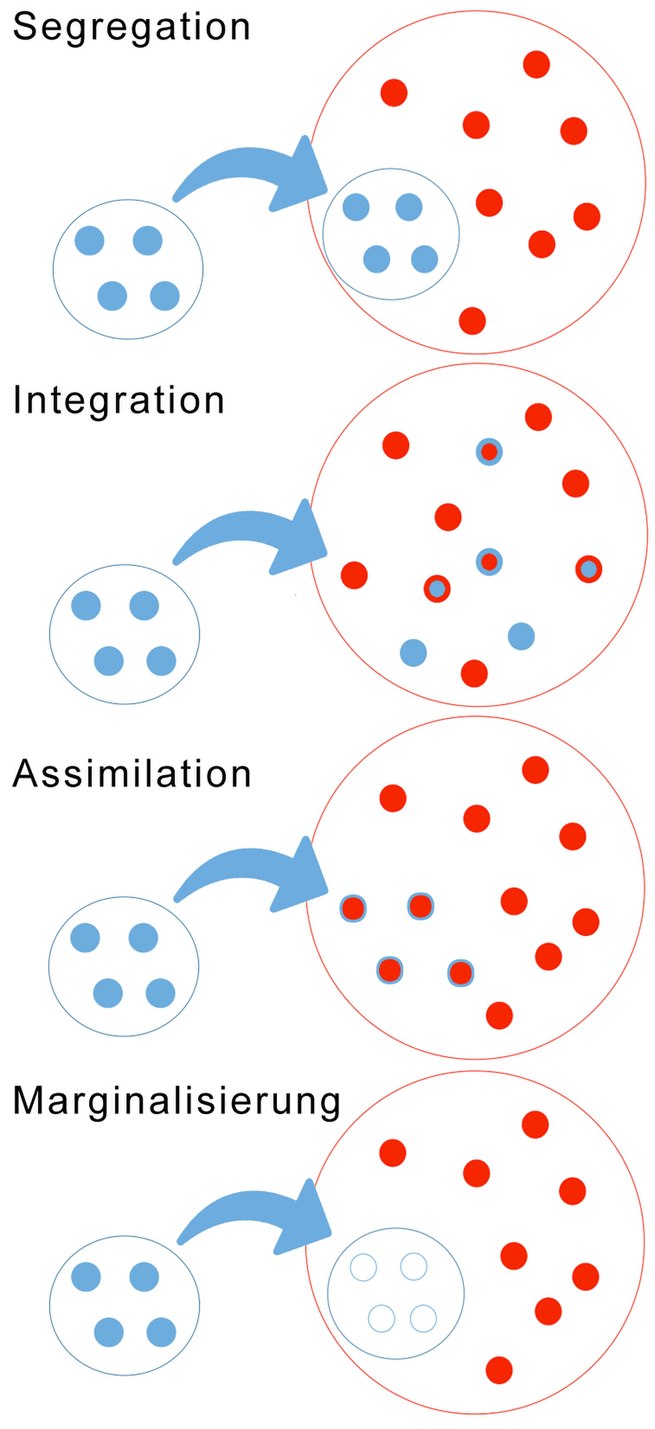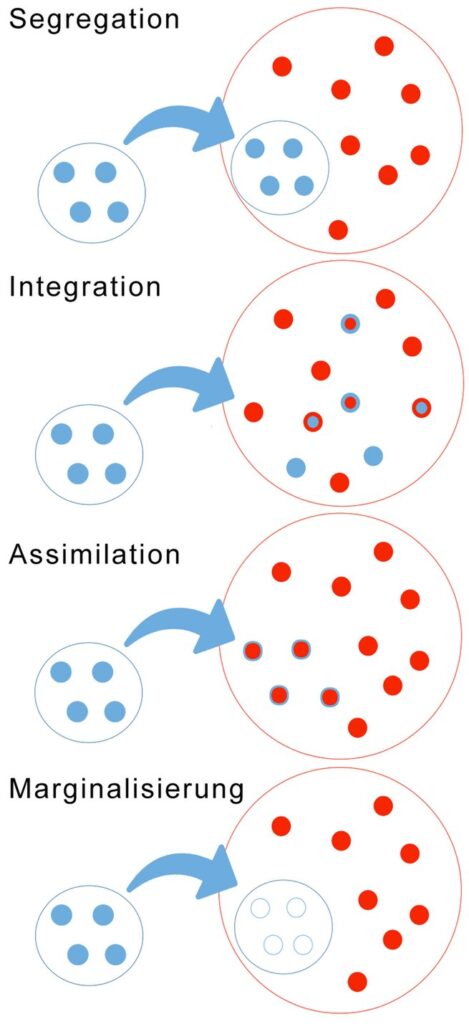
Main Difference
The main difference between Acculturation and Enculturation is that the Acculturation is a process of cultural and psychological change and Enculturation is a process of acquiring values from a neighboring culture
-
Acculturation
Acculturation is a process of social, psychological, and cultural change that stems from the balancing of two cultures while adapting to the prevailing culture of the society. Acculturation is a process in which an individual adopts, acquires and adjusts to a new cultural environment. Individuals of a differing culture try to incorporate themselves into the new more prevalent culture by participating in aspects of the more prevalent culture, such as their traditions, but still hold onto their original cultural values and traditions. The effects of acculturation can be seen at multiple levels in both the devotee of the prevailing culture and those who are assimilating into the culture.At this group level, acculturation often results in changes to culture, religious practices, health care, and other social institutions. There are also significant ramifications on the food, clothing, and language of those becoming introduced to the overarching culture.
At the individual level, the process of acculturation refers to the socialization process by which foreign-born individuals blend the values, customs, norms, cultural attitudes, and behaviors of the overarching host culture. This process has been linked to changes in daily behaviour, as well as numerous changes in psychological and physical well-being. As enculturation is used to describe the process of first-culture learning, acculturation can be thought of as second-culture learning.
Under normal circumstances that are seen commonly in today’s society, the process of acculturation normally occurs over a large span of time throughout a few generations. Physical force can be seen in some instances of acculturation, which can cause it to occur more rapidly, but it is not a main component of the process. More commonly, the process occurs through social pressure or constant exposure to the more prevalent host culture.
Scholars in different disciplines have developed more than 100 different theories of acculturation, but the concept of acculturation has only been studied scientifically since 1918. As it has been approached at different times from the fields of psychology, anthropology, and sociology, numerous theories and definitions have emerged to describe elements of the acculturative process. Despite definitions and evidence that acculturation entails a two-way process of change, research and theory have primarily focused on the adjustments and adaptations made by minorities such as immigrants, refugees, and indigenous people in response to their contact with the dominant majority. Contemporary research has primarily focused on different strategies of acculturation, how variations in acculturation affect individuals, and interventions to make this process easier.
-
Enculturation
Enculturation is the process by which people learn the dynamics of their surrounding culture and acquire values and norms appropriate or necessary to that culture and its worldviews. As part of this process, the influences that limit, direct, or shape the individual (whether deliberately or not) include parents, other adults, and peers. If successful, enculturation results in competence in the language, values, and rituals of the culture.The process of enculturation, most commonly discussed in the field of anthropology, is closely related to socialization, a concept central to the field of sociology. Both roughly describe the adaptation of an individual into social groups by absorbing the ideas, beliefs and practices surrounding them. In some disciplines, socialization refers to the deliberate shaping of the individual. In others, the word may cover both deliberate and informal enculturation.The process of learning and absorbing culture need not be social, direct or conscious. Cultural transmission can occur in various forms, though the most common social methods include observing other individuals, being taught or being instructed. Less obvious mechanisms include learning one’s culture from the media, the information environment and various social technologies, which can lead to cultural transmission and adaptation across societies. A good example of this is the diffusion of hip-hop culture into states and communities beyond its American origins.
Enculturation has often be studied in the context of non-immigrant African Americans.
Conrad Phillip Kottak (in Window on Humanity) writes:
Enculturation is the process where the culture that is currently established teaches an individual the accepted norms and values of the culture or society where the individual lives. The individual can become an accepted member and fulfill the needed functions and roles of the group. Most importantly the individual knows and establishes a context of boundaries and accepted behavior that dictates what is acceptable and not acceptable within the framework of that society. It teaches the individual their role within society as well as what is accepted behavior within that society and lifestyle.
Enculturation is sometimes referred to as acculturation in some literatures. However, more recent literature has signalled a difference in meaning between the two. Whereas enculturation describes the process of learning one’s own culture, acculturation denotes learning a different culture, for example, that of a host. The latter can be linked to ideas of a culture shock, which describes an emotionally-jarring disconnect between one’s old and new culture cues.
Famously, the sociologist, Talcott Parsons, once described children as “barbarians” of a sort, since they are fundamentally uncultured.
-
Acculturation (noun)
A process by which the culture of an isolated society changes on contact with a different one.
-
Acculturation (noun)
A process by which a person acquires the culture of the society that they inhabit, starting at birth.
-
Enculturation (noun)
The process by which an individual adopts the behaviour patterns of the culture in which they are immersed.

